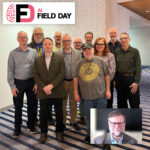|
|
 Luke Norris presented for Kamiwaza at AI Field Day 6 |
The Power of a True Enterprise AI Orchestration with Kamiwaza
Watch on YouTube
Watch on Vimeo
Kamiwaza is a groundbreaking platform designed to enable enterprise AI at scale. Its Distributed Inference Mesh and Locality-Aware Data Engine deliver unmatched performance across diverse environments, including cloud, on-premises, and edge locations, while remaining independent of specific silicon technologies. A key focus is inference optimization for the operational aspect of AI, addressing the challenges of increasing inference loads associated with complex applications like retrieval-augmented generation (RAG) and autonomous agents. The platform tackles the “data gravity” problem, which significantly hinders enterprise AI adoption, by processing data locally wherever it resides to minimize data transfer and maintain data sovereignty.
The Kamiwaza platform distinguishes itself through four key differentiators. First, it provides a complete, opinionated yet loosely coupled enterprise AI stack delivered within Docker containers, allowing for rapid deployment and easy customization. Components like vector databases can be swapped with minimal code changes. Second, the global inference mesh and locality-aware data engine enable distributed inference across multiple locations, intelligently routing requests based on data location and available resources. This approach drastically reduces data movement while maintaining performance and compliance requirements. A global catalog service tracks metadata across all locations, facilitating efficient data access and processing.
Finally, Kamiwaza’s architecture is completely silicon-agnostic, enabling deployment on diverse hardware in various environments. It offers a unified API across all locations, fostering seamless integration with existing enterprise security and authentication systems. This approach, combined with its ability to integrate third-party and in-house Agentic applications, positions Kamiwaza as a “Docker for Enterprise AI,” simplifying the deployment and management of large-scale generative AI solutions across complex, distributed enterprise infrastructures.
Personnel: Luke Norris, Matt Wallace
Kamiwaza – A Single API and SDK for GenAI Applications to Run in the Enterprise
Watch on YouTube
Watch on Vimeo
Experience a live demo showcasing Kamiwaza’s capabilities, including how our platform seamlessly integrates third-party applications via our SDK and API across all locations and silicon. A technical demo showed data ingestion for the RAG process and how data and security integrations, such as authentication, are handled for both internal and third-party enterprise applications. Kamiwaza positions itself as a “Docker for Generative AI,” providing a single API and SDK to manage multiple GenAI applications, eliminating the need for individual stacks and security layers for each application. This approach allows for seamless interaction between various applications, significantly boosting efficiency and delivering tangible business outcomes.
The platform boasts hardware agnosticism, enabling large language models to run on diverse hardware, from single servers to large clusters. Bench testing demonstrates impressive throughput, with a 70B parameter model achieving 8,000 tokens per second on a single 8-way AMD MI300 server. Kamiwaza is offered in several tiers: a free community version, a per-GPU licensing model for smaller deployments, and a $25,000 enterprise edition with unlimited GPUs. The enterprise edition includes unique outcome-based support, where a dedicated GenAI architect helps clients achieve specific business goals, ensuring the platform delivers practical value and isn’t just shelfware.
Unlike other solutions focused solely on infrastructure, Kamiwaza also addresses the application layer through its “app garden” and provides integrations with other observability tools. While they are not currently integrating at the prompt level, they leverage existing solutions to provide a robust and scalable platform. Future development includes expanding the app garden to allow third-party developers to easily build and deploy their own applications and agents. The company’s vision is to facilitate a more modular and customizable enterprise GenAI ecosystem, challenging the traditional monolithic approach to enterprise software and enabling rapid development of tailored AI solutions.
Personnel: Luke Norris, Matt Wallace
Move from the AI Pilot Circle of Doom to Achieving Outcomes Today with Kamiwaza Enterprise Outcome Support
Watch on YouTube
Watch on Vimeo
Discover how Kamiwaza’s outcome-driven approach ensures measurable success for organizations of any size. This novel approach enables not just break-fix support but true outcome-based support of AI workflows and applications. The Kamiwaza platform facilitates innovation across various sectors, including manufacturing and government, as demonstrated through real-world use cases presented at AI Field Day 6. The presentation showcased the platform’s capabilities through live demos, highlighting its user-friendly interface and powerful features for managing and deploying AI models, even large language models.
A core element of the Kamiwaza platform is its cluster management system, enabling seamless deployment and scaling of models across various environments, from local machines to cloud-based clusters. The platform leverages Ray, a distributed computing framework, for efficient load balancing and resource allocation. Demonstrations included data ingestion and processing pipelines, showcasing the platform’s ability to handle large datasets and distribute workloads effectively across multiple nodes. The presentation also emphasized the platform’s developer-centric design, providing tools and APIs for building and integrating custom AI applications.
Furthermore, the presentation explored the concept of “agents” within the Kamiwaza ecosystem, illustrating how these agents can automate complex tasks and workflows. Examples included automated data conversion, report generation, and even the creation of new applications based on user requests. The agents’ capabilities were demonstrated through live demos, emphasizing their potential to significantly accelerate AI-driven processes and improve efficiency. The presenters highlighted the importance of human oversight and collaboration, emphasizing that while agents automate tasks, human experts can provide crucial guidance, ensuring accuracy and contextual understanding, particularly when dealing with complex or sensitive data.
Personnel: Luke Norris, Matt Wallace
Kamiwaza Model Context Protocol for Private Models – Inferencing and Data Within the Enterprise
Watch on YouTube
Watch on Vimeo
In this segment, we demonstrated how MCP (Model Context Protocol) enables enterprises to integrate and manage private models and agents through Kamiwaza. The presentation showcased a simple chat interface capable of handling complex tasks, such as interacting with GitHub to review and fix code. This was achieved through the open-source Model Context Protocol (MCP) and accompanying tools, all of which are designed to simplify the integration of private AI models into existing workflows. The demo highlighted the platform’s ability to bridge the gap between AI innovation and practical enterprise solutions.
A key element of the demonstration involved an agent with a defined persona that could execute a series of tasks based on simple instructions. These tasks included cloning a repository, copying files, analyzing code, debugging, and committing changes, all within a private and controlled environment. This demonstrated the power of MCP in enabling more complex agent interactions while maintaining control and security. The presenters also emphasized the open-source nature of both the front-end application and the back-end server, fostering community contributions and broader adoption of the technology.
The presentation further showcased Kamiwaza’s broader strategy, encompassing both highly customized, enterprise-specific applications and simpler, more general-purpose tools like chatbots and research assistants. The platform aims to simplify the deployment and management of these tools, integrating them with existing data and infrastructure. Kamiwaza plans to release open-source ports of several useful applications to further encourage adoption and collaboration within the community. A significant portion of the presentation also focused on the platform’s potential to replace traditional RPA systems, providing a more flexible, cost-effective, and ultimately more powerful solution for automating enterprise processes.
Personnel: Luke Norris, Matt Wallace









